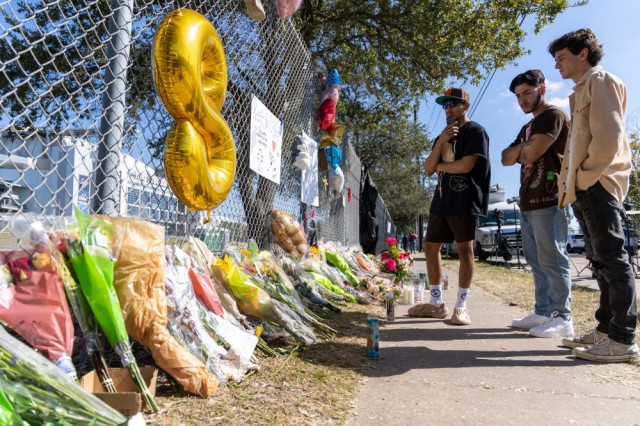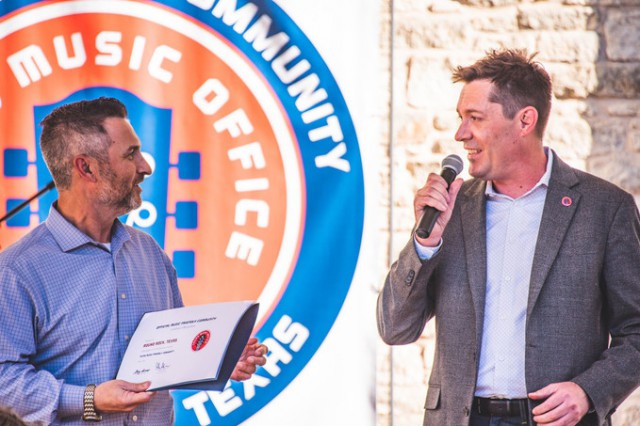Governor Greg Abbott’s Task Force on Concert Safety - April 2022 Report

INTRODUCTION
On the evening of November 5, 2021, at the Astroworld Festival near Houston, a concert turned into tragedy as the attending crowd surged, causing multiple fatalities and serious injuries. In an effort to mitigate risk of any future tragedy, the State of Texas is committed to analyzing the aspects of mass gatherings within state jurisdiction and identifying possible improvements.
In furtherance of that goal, Governor Greg Abbott formed the Texas Task Force on Concert Safety (TFCS), saying,
“Live music is a source of joy, entertainment, and community for so many Texans—and the last thing concertgoers should have to worry about is their safety and security. To ensure that the tragedy that occurred at the Astroworld Festival never happens again, I am forming the Texas Task Force on Concert Safety. From crowd control strategies and security measures to addressing controlled substances, this task force will develop meaningful solutions that will keep Texans safe while maximizing the joy of live music events.”
This report is the culmination of the work done by the TFCS.
The recommendations in this report are narrowly tailored to address gaps that were identified as contributing to safety failures at the Astroworld event. The TFCS also proactively used this process to enhance the State’s standard of safety practices for mass gatherings of all types.
While some level of risk is inherent in any mass gathering, it is the opinion of the TFCS that proper planning will allow Texans to enjoy safe performances, concerts, and other culturally significant events.
Safe gatherings are possible when everyone does their part.
ABOUT THE ASTROWORLD FESTIVAL
 Scoremore Productions, a subsidiary of Live Nation Concerts, hosted the performer and native Houstonian, Travis Scott, in a parking lot structure at NRG stadium.
Scoremore Productions, a subsidiary of Live Nation Concerts, hosted the performer and native Houstonian, Travis Scott, in a parking lot structure at NRG stadium.
The manufactured outdoor nature of the event is germane to increased safety risks. According to officials, no permits were obtained.
Hours before the performance began, the perimeter was breached by unticketed attendees. This rush of people overwhelmed available resources, leading to a variety of reported injuries throughout the day.
By mid-concert, on-site medical staff was dealing with a number of these injuries. In addition, the Houston Fire Department self-initiated a response, which ultimately led to the declaration of the event as a mass-casualty incident.
Notwithstanding the declaration, the concert continued for another half hour. Crowd compression continued despite the efforts of emergency personnel to stop the concert and aid those in distress.
Sadly, ten concert attendees lost their lives, including a ten-year-old boy, and hundreds of others were sent to the hospital with critical injuries.
TASK FORCE PROCESS
In a press release issued on November 10, 2021, Governor Abbott announced the formation of the TFCS. One week later, the group had its first of five group meetings. These meetings were conducted by conference call, followed by one videoconference meeting, and three hybrid in-person and virtual meetings held at Globe Life Park, Texas A&M Engineering Extension Service (TEEX), and the Alamodome. One-on-one interviews with TFCS members were also part of the process.
The Texas Music Office (TMO) invited participation by established experts in the fields of concert promotion, public safety, first response, and government permitting.
Attendees included representatives from:
Events Safety Alliance, C3 Presents, International Association of Venue Managers (IAVM), UMass Memorial Medical Center, the Texas Alcoholic Beverage Commission, City of Richardson Police, Thornton Thomasetti, TEEX, Dr. Gil Fried from the University of West Florida, Salient Strategies, Texas Municipal Police Association, State Fair of Texas, Houston Livestock Show and Rodeo, LJT Texas Music Festival, NWS Weather Forecast Office, Texas Restaurant Association, 5 Star Event Services, Audio Evidence Forensics, Levitt Pavilion, Houston Professional Firefighters Association, Music World Entertainment Corporation, Live Oak Civic Center, GK Still International, Allied Universal Event Services, Texas Motor Speedway, American Airlines Center, Homeland Security Operations, Globe Life Park, Texas Rangers Organization, Texas Association of Counties, Texas Municipal League, Sheriff’s Association of Texas, Alamodome, SXSW, TNT Security Solutions, Code 4 Emergency Services, and several other music industry veterans and public safety officials who contributed invaluable insights during the course of the work.
Each meeting featured presentations from established experts on event promotion and crowd safety, general discussion, and time for question-and-answer sessions. PowerPoint slide decks presented to the TFCS can be found in the index of this report.
Brendon Anthony, Director of the Texas Music Office (TMO) in the Office of the Governor served as chair and facilitator. Rebecca Reynolds and TMO staff provided support.
TASK FORCE FINDINGS
The group meetings and one-on-one discussions produced the following recurring themes:
- Unified On-Site Command and Control
- Permitting
- Training
- Planning with Risk Assessment, and
- Centralized Resources.
FINDING 1: Unified Command and Control (UCC)
Existing Reference Documents include NIMS, ICS, ESA Manual, and TEEX website.
The ultimate function of a centralized on-site command and control group is to establish authority and process for pausing or canceling a show in response to a safety incident.
As with weather-related events, the TFCS identified the need for clearly outlined triggers for pausing or canceling. These triggers must be outlined in event permit applications and agreed upon by the members of the UCC in advance. Successful implementation requires representatives from local 911 response, as well as a designated representative from the production team with “show stop” authority, to remain on site throughout the event. Chain of command must be clearly communicated and documented.
The TFCS strongly supports a requirement that event promoters determine which EMS/Fire/Police agencies would respond to a 911 call on the site of their event and that those agencies be employed as UCC members. Support security from other jurisdictions can be allowed but should not replace inclusion of local response agents. Preshow collaboration with these entities is needed to strengthen communication during a crisis.
Communication is key when seconds matter. Local first response teams have existing relationships which can make communication more efficient. These teams can work with hired security to conduct in-depth shift briefings to achieve consistent awareness and preparedness among all event staff, employees, and volunteers throughout all phases of an event.
FINDING 2: Permitting
Events within municipal jurisdiction are permitted under municipal rules. This section will primarily address permitting for unincorporated areas of Texas. However, the TFCS strongly recommends that even mass gathering events permitted by municipalities should follow permit guidelines and best practices for unincorporated areas that are outlined in state statute.
There are two governing statutes with permit requirements: the Mass Gathering Permit required by Chapter 751 of the Texas Health and Safety Code and the Outdoor Music Festival Permit required by Chapter 2104 of the Texas Occupations Code.
Highlighted in the discussion of the Astroworld event was the fact that the County had jurisdiction over the permitting requirements, but City 911 was responsible for responding to event incidents. Additionally, there was no Occupancy Load issued for the event, which is typically determined by the Fire Department. A consistent permitting process could have helped established jurisdiction and authority over ultimate event shutdown in the face of a life-threatening incident.
Sheriffs and County Judges on the TFCS, who are responsible for issuing these permits in their areas, shared that many event promoters are not aware of the permit requirements, while others intentionally falsify applications or ignore the process all together. Therefore, it is the goal of the TFCS to make the public aware of these requirements, as well as the penalties for not complying with permitting requirements.
To that end, the TMO has created an online Event Production Guide that can be easily promoted and accessed through the Task Force on Concert Safety webpage on the TMO website. The intent is that the availability of this centralized resource will remind event promoters of the existing legal requirements and encourage them to follow best-practice recommendations.
It is a criminal offense to act as a promoter of an outdoor music festival without registering with the county in which the festival is to be held, or to direct or control an outdoor music festival without a permit issued under Occupations Code Chapter 2104. Both of these are misdemeanor offenses carrying criminal penalties that can include both a fine up to $1,000 and 30 days of confinement in county jail. Promoting a mass gathering without a permit issued under Health and Safety Code Ch. 751 is also a misdemeanor offense, with penalties of up to $1,000 and 90 days of confinement in county jail. Additionally, the Department of Public Safety has adopted rules in 37 Tex. Admin. Code Ch.1, Subch. L relating to minimum standards that must be maintained at a mass gathering to protect public safety and maintain order. County officials should be aware of these laws and prepared to enforce them.
The TFCS recommends that local authorities stop the show when it is determined that an event has been organized without a permit or has breached the bounds of the issued permit. The TFCS strongly encourages local officials avail themselves of these enforcement mechanisms whenever applicable. Additionally, the TFCS recommends the Legislature consider increasing fines and penalties for noncompliance and repeat violations.
The TFCS discussion revealed that the permitting process is inconsistent across the state, which can lead to forum shopping by event promoters seeking certain permitting requirements. To establish a statewide baseline, the TFCS recommends implementation of a universal permitting template. This template would be informed by those counties that have historically hosted successful events and could provide guidance on what is statutorily required in permit applications. The template would serve as a “floor not a ceiling,” allowing for local issuers to add relevant information according to the area and type of event.
Additionally, the TFCS recommends that any template include a standardized checklist for County Judges responsible for issuing permits. The Texas Association of Counties identified the need for clear direction on what makes a successful event permit application, beyond simply filling out the form correctly. This would provide an opportunity for the issuer and applicant to work together on getting to “yes.” Both parties should sign the agreed upon requirements, creating shared responsibility. The Texas Association of Counties, along with other organizations, should include this information in the workshops they provide for newly elected officials.
FINDING 3: Training
“The best surprise is no surprise.”
Crowd safety has been studied by experts such as IAVM and TEEX, resulting in robust training resources for promoters, staff, and first responders. These and other groups provide courses for frontline staff, some of which are free and sponsored by state and federal funding, as well as multi-semester programs culminating in certification. A list of these will be included in the Event Production Guide.
Public and contracted security and event staff must have adequate training for each specific event. A series of preshow steps, such as tabletop exercises, site walkthrough drills, security briefings before and after shifts, establishment of a clear and well-disseminated communication tree, and agreed-upon show-stop triggers and responses are some of the elements of successful event protocol.
Participating in the available training courses and conducting the suggested exercises can support a showing of due diligence.
FINDING 4: Planning with Risk Assessment
Compared to shows in established venue structures, such as the ATT Center or Globe Life, manufactured events like the Astroworld show, which occurred in a parking lot, require unique contingency plans. For these manufactured events, there is a serious safety risk if venue borders are susceptible to a breach that results in unauthorized entrance to the grounds, and especially into sections reserved for first responders. This influx of people can overwhelm even a well-planned event’s security and staff and may result in the introduction of contraband not screened at designated entry points.
Crowd control can be impacted by the design of the event. Barricades can be used to do the work of staff by guiding attendees into rounded areas with forward and backward egress, rather than angular areas where people can get trapped. Best practices for event design will be included in the Event Production Guide.
Planning with risk management in mind must include prepared materials identifying reasonably foreseeable hazards and responses, as well as an established communication tree with local response strategies and agreed-upon conditions for the transfer of authority from event staff to responding agencies in the event of an emergency.
Public service announcements can inform attendees of any emergent situations and urge collective accountability and responsibility for the safety of others gathered at the event. A Concert Attendee Code of Conduct should be part of the ticketing process and make clear what behaviors will lead to ejection. Messaging of these rules and encouraging sound bites to look out for one another will increase a culture of crowd safety.
Regular scrubbing of social media hashtags and artist accounts are part of diligent planning and should continue throughout the event to ascertain the mood of the crowd in real time. Research into the artist is critical. Promoters on the TFCS recommend communicating with other venue representatives that have hosted the artist before. Some artists have a documented history of encouraging attendees to disregard public safety. When an artist does this, it could be considered a breach of contract and come with responsibility for any damage to property and people. Event promoters should partner with artists to encourage safety, since messaging from the artist can be uniquely persuasive for fans.
FINDING 5: Centralized Resources
The TFCS received a large collection of resource documents that informed many of the recommendations laid out in the above sections. The TMO will host these resources on its website as part of the Event Production Guide.
Presented to Governor Greg Abbott
April 19, 2022
Event Production Guide
A large collection of resource documents were submitted to the Task Force on Concert Safety (TFCS). Many of the recommendations laid out in the Task Force Report are taken from them. The Texas Music Office will host a depository of these resources on its website as part of the Event Production Guide, outlined in the links and resources listed here.
Texas Standard Interview w/Brendon Anthony
Brendon Anthony, director of the Texas Music Office in the Office of the Governor, spoke to the Texas Standard about the Task Force’s findings and recommendations for how to improve event safety in Texas. Listen to the interview above or read the transcript here.
Texas Music Office News
Stay up to date with the TMO's news, workshops, and economic development work around the state via the News section of the TMO website, including TMO social media channels.



